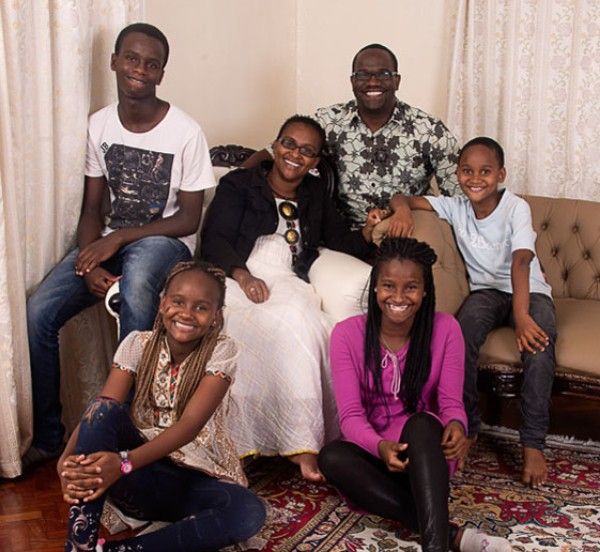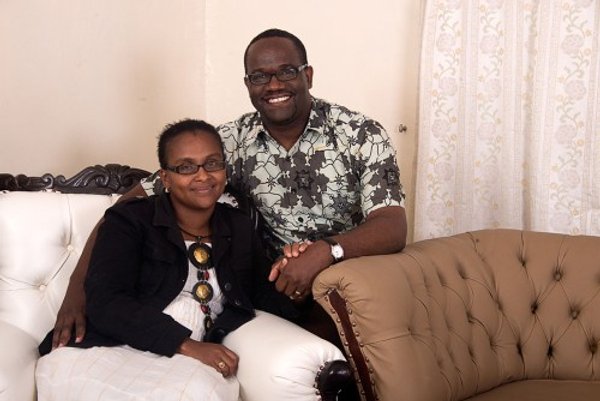Hi! Great of you to join us for this e-interview!
A. Thank you very much for inviting us!
Q. Maybe we could start with a bit of an introduction about yourselves: who you are and what you do 8-5.
Raymond, maybe you could handle this one.
A. I am Raymond Mutura. I am a General Manager for Data Integration Technologies /Fintech and part of the Loita Holding Group Corporation. Evelynne is the Program Manager for Program for Family Development at Strathmore Business School.
Q. Evelyne, how long have you guys been married? And how many children have you been blessed with?
A. We have been married since 2001. We have 4 children: David (13), Margaret (12) , Elizabeth (11) and Peter John (8).

Q. Great! Your names are pretty synonymous with the Program for Family Development Courses that are being run in Nairobi, Mombasa and we hear Kampala as well. Ray, if you could, kindly introduce us to who runs PFD in Kenya.
A. The three couples at the heart of these courses in Kenya include myself (Raymond Mutura – current President of PFD, Vice President IFFD English Speaking Africa and Board member of IFFD), my wife Evelyn Mutura – Program Manager PFD. The other two couples are Antony and Winnie Nzamu (in charge of Team Leaders) and Tom and Ann Kimani (in charge of moderators). We have since added two other couples. They are Jimmy and
Christine Sakwa (in charge of Finance Management) and Henry and Catherine Kanyonga (in charge of PR, Marketing & the Unmarried Professional Program).
Q. Evelyne, what in your experience in PFD all these years would you say is unique about it? What do you like most about it?
A. The network of couples and families that look to growing together and supporting one another.
Q. Ray, what do you like most about the PFD courses?
A. They really enable one to think about situations. They enable one to search and establish critical ground rules on principles, individually and jointly. Most importantly is the fun we get in going through the cases with other couples. It is so amazing that we all have the same problems.
Q. And what has been the greatest challenge in running this program for example here in Nairobi?
A. The greatest challenge is to get couples who think they know it all. The other great challenge is to see so many people in ignorance, who do not know and who take quite a long time to see the point, this is especially the case with men. Some of these imagine that they are still shielded by the extended family’s support and claim, well, they came out well, so no need for courses on parenting – these are obvious things they say. So, our greatest challenge is ignorance.
Others challenges are related to developing a good team of moderators. It is very costly to get people who are prepared by the education system with a clear understanding of the anthropology of man. Thus, we are curtailed from expanding because we must be so sure.
Another challenge is related to getting people understand the case study method, especially on the need to go through our cases four times – individual, couple, team, General Session. The benefit of the courses is however found in adhering to this process.
Q. I suppose at the end of the various courses you get feedback from the participants whether formally or informally in evaluation forms or over a friendly tete-a-tete in the corridors; Evelyne, what are two of your sweeter memories of some of these pieces of feedback?
A. I remember now one time when a young mother commented that knowing how to help their children achieve their milestones made her and her husband very happy and confident in their parenting tasks. A favorite with the couples is the topic of temperaments vi-a-vis husband/wife and the parents/children angles.
Q. Ray, any delightful feedback you especially remember?
A. The one that really amazes me is to see parents who have put some of the ideas in practice and when you visit them you see how well their children can sleep, eat, be orderly and maintain hygiene in such simple and practical ways… Little children sleeping when put to sleep, eating with a spoon at age 1-2. For the couples, it is to see the graduation ceremony of Married Love with 4-5 expecting, year after year…
Q. We’re informed that you were part of the Kenyan delegation that attended the 19th Congress of the Family in Mexico earlier last month. What was that all about? Ray?
A. Every 3-4 years all those working on family enrichment across the world attend a congress. The congress is organized by the IFFD international and targets the over 60 countries where IFFD is present. Being a Vice President for English Speaking Africa, I attend this congress and other meetings that include the Board meeting for IFFD and the World Meeting of Leaders. The congress targets all those that have benefited from the IFFD
work. We got a surprise whilst in Mexico. We got the Rafael Pich Award for being the country with most focus on adhering to the IFFD spirit and approach.
Q. Wow! Congratulations!
Back at home, Evelyne, what kind of courses do you run and when is the next intake?
A. We have one targeting married couples. It is called Married Love. We also target a number of parenting courses including:
First Steps for parents with children between 0-3
First Letters for parents with children between 4-7
The first three commenced on 6th February 2016 in Strathmore Business School
Then we have Maisha – for unmarried professionals. This commenced on 13th February 2016 at the Intercontinental Hotel.
Other courses already commenced in January for Kianda and Strathmore School. They include First Letters, Married Love, Adolscence and the Teenager Programmes.
Q. What do you expect from a couple who wants to enroll in such a course?
A. Well, to participate in the course through the methodology of engaging on the case studies. We also invite them to come ready to listen/introspect themselves. They will be amazed at how much one learns and how much one has fun in learning to be a better spouse/parent. We also invite them to loosen themselves and realize that their challenges are everyone else’s challenges.
Q. And Ray, one last question for you: what would you say is the long-term goal as regards the PFD courses?
A. We have a simple but very challenging vision: to be in every school, in every town, in every county in Kenya and eventually in Africa. We also want to roll out other courses. So far we have three that we have not touched on in Kenya. They include Grand Parents, First Conversations and Married Love for Older couples.
Q. And how can people interested in attending these courses get in touch?
A. They can write to pfd@strathmore.edu, or visit us at SBS.
Q. Brilliant! Well, Raymond and Evelyne, a million thanks for making time for this interview! Hope to hear more from PFD!
A. Certainly! Many thanks for having us!
For more information, click the link below:
